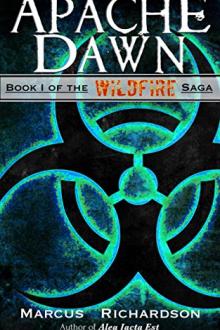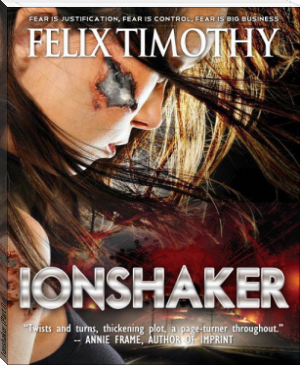Apache Dawn - - (classic fiction .TXT) 📗

- Author: -
- Performer: -
Book online «Apache Dawn - - (classic fiction .TXT) 📗». Author -
The President stifled a shiver. It was exactly like Reginald had said.
“My last communication indicated that they had commandeered a squadron of Apaches—”
“General, I do not want your men gathering an army. I want them to bring that man in so we can save our country. You are to order them to get him in, post haste. Is that clear? Their mission is not to rescue orphaned soldiers along the way.”
“Yes, sir. Of course, Mr. President. The problem, sir, is that the Koreans, or maybe the Chinese, have been on their tails since the get go. I’m tracking reports of incoming light ICBMs. They’re dropping down near where my boys are on a regular basis. Installations thought to be well behind the occupied zone are coming under attack, always when the Source comes within about a hundred or so miles.”
“Are you suggesting that the Chinese have his HD-GPS locater code?” the CIA chief said, incredulous.
“Jesus,” muttered the Secretary of Defense. He nervously shuffled some papers. “Sir, we can’t take the risk that the Koreans are tracking him—if we take him to Johns Hopkins—”
“We could lose the last major facility at our disposal that is already set up to handle the vaccine production,” finished the President. “I understand your concerns, but we have to take that risk. That young man is our best hope for turning the tide against this flu. If we can stop the flu, we can turn our full attention on the North Koreans. But the death toll…” He glanced at the Secretary of Homeland Security.
“Sir, my people are getting worried we’ve reached the tipping point.”
“Tipping point?”
“Yes, Mr. President. The point at which individual people infected with the flu are just infecting one person—who then infects one more person. That’s the normal case for seasonal flu; that’s why it dies out every year. A one-to-one infection ratio is not sustainable for very long. What we’re facing now though…well, we think we’re approaching—if we haven’t already passed it—is the point where one person will infect two or even three people, who then infect two or three more, each. The infection rate grows exponentially and before long…”
“Wildfire,” said the President. Jesus. The Great Pandemic, Part Two.
A sweaty sheen reflected off the Secretary’s forehead. “Sadly, yes, Mr. President. We’re starting to see disturbingly large infection reports from most of the major population centers, nationwide. It’s now spreading into the suburban and rural areas.”
“So maybe this thing will burn itself out?” asked the Secretary of Defense. “We should be focusing on the North Koreans, sir, or there won’t be a country left to—”
“If only that were true,” interrupted the Secretary of Homeland Security. “In the 1918 pandemic, the rural areas of the country and more isolated areas of the world saw a huge increase in fatalities. We’re talking, it went from a 4 percent mortality rate in Philadelphia to 85 percent in Alaska. Entire towns were erased from existence.”
“Holy God…” said the Secretary of Defense.
The President thought back to his conversation with Reginald. The conservative base in the country moved to the rural areas decades ago. They still have their guns and Bibles, but now they have the biggest target on their backs for the flu. He had to try hard not to smile. Goddamn Koreans may have helped me out more than they’ll ever know…
“Okay,” said the President. “Is there anything we can do about the flu right now?”
No one said anything.
“Very well, then, keep working on it. Bring in the Source. But in the meantime, Al is right, we need to get a handle on these North Koreans. Do we know where they’re launching their ICBMs from?”
“Sir, they don’t have missiles that are land based and capable of hitting targets in the CONUS, unless the Koreans have shipped mobile launchers in-theater…” said the NSA chief. “Either that, or China is launching them.”
The President turned his eyes on Admiral Bennet. “Admiral, it’s time to take the gloves off. I want that invasion fleet—whoever the hell it belongs to—on the bottom of the Pacific, and I want it done yesterday.”
“Sir—”
“Everything but nuclear is at your disposal, Admiral. Do what it takes, be ruthless. I want the North Koreans to suffer for this. Everyone knows we have the most dangerous navy on the planet—I want you to prove it.”
The oil-slick smile that spread on the Admiral’s face chilled the President to his core. “Sir, you call down the thunder and we’ll reap the whirlwind. We’ll make those communist bastards sorry they even thought about pulling a stunt like this.”
“You’ve got a blank check, Admiral. Get it done. Make an example of them.”
“Yes, sir. I’ll issue new orders to the Pacific fleets at once, sir.”
“If you need air support, let General Andrews know and coordinate. General, I expect full cooperation in this.”
“Of course, Mr. President. SAC is ready and able to assist.”
An aide stepped into the room and got the President’s attention. He pointed at his watch and held up his hand, fingers spread wide. Five minutes.
“Am I the only one that doesn’t like where this is going?” cried the Secretary of State. “As long as this is contained on our shores, it’s manageable. Sir, opening the floodgates on North Korea…it could start World War III.”
“Open your eyes, Madam Secretary. We didn’t start it,” said Admiral Bennet.
The President stood, silencing opposition. “All right everyone, we’ll meet again this evening. I want status reports on the hour. If you’ll excuse me, I have a speech to make.”
God forgive me, he thought as the screens started to go black. I’m about to turn over parts of this country to foreign powers. How did I get roped into this? This wasn’t how I wanted it to go. Not at all. As his mood darkened, another thought crossed his mind like a bolt of lightning splitting the dark of night. Where’s Jayne?
With pleasing thoughts of his mistress flitting about in his imagination, the cares of office drifted to his periphery once again. Once the nasty business of the speech was over with, he would find her and get a little stress relief.
For the first time in days, the President smiled.
Northern Idaho
Near the Oregon Border
“This activation of the Emergency Alert System covers all states and territories of the United States. Stay in your homes during this health emergency. If you must leave, do so only to find food, water, or medical supplies. Keep your mouth and nose covered—wash your hands immediately—avoid contact with anyone not in your immediate family. All unnecessary travel by nonemergency personnel will result in arrest and prosecution in federal court. Keep the roads clear for our first responders.
“This message is especially important in the following cities: Boston, New York, Philadelphia, Baltimore, Washington, D.C., Norfolk, Raleigh, Charleston, Savannah, Jacksonville, and Miami. Do not be alarmed. The soldiers you see on your streets are from the United Nations peacekeeping force and are here to help. If they require assistance, you are ordered by law to render aid to the best of your ability…
“Constitutional rights and privileges have been suspended in these cities until such time as the President and Congress deem the crisis to have passed. Please be patient with the peacekeepers. Not all of them speak English. If you have any concerns, please contact your local FEMA office. Repeat. The President has activated the National Emergency Alert System. The following announcement…”
“Ain’t that some shit?” asked Captain Alston.
Chad rubbed the fatigue from his face and noticed again the bristle-like stubble on his face. It had been days now since he had seen the inside of a hot shower and a warm bed. He sighed and handed the gunner a wrench as the man tried to adjust a stubborn part of the Black Hawk’s guts. National crisis aside, he just had no energy left to worry about what was going on a thousand miles away anymore.
It was the second time the little squadron of helicopters, five Apaches and the Black Hawk, were safely parked at one end of a small civil airport. Well, Chad told himself as he looked around, at least this place is deserted. The little airfield was populated with three hangers and a few small, single-engine planes chained to the tarmac in storage parking.
Chad watched as once again, the Rangers sprinted off





Comments (0)